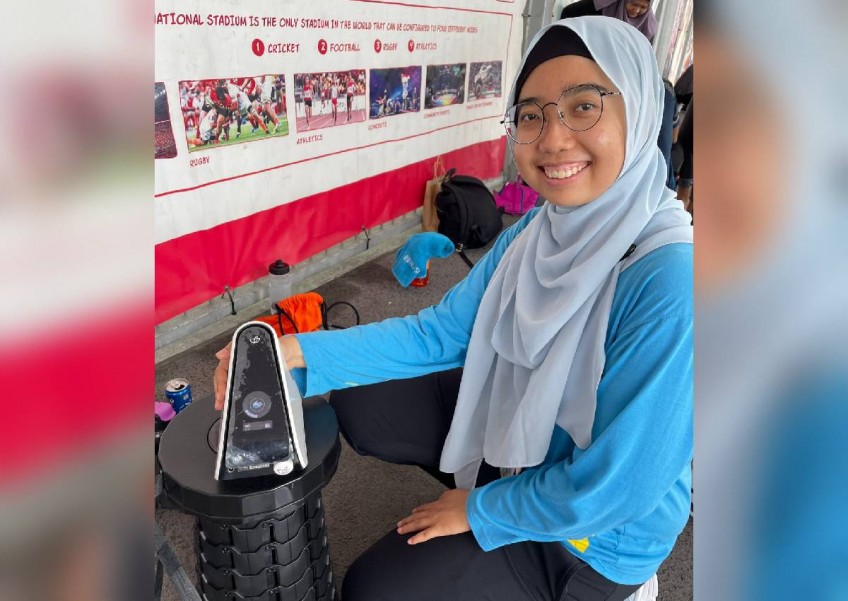'I was hearing voices in my head': Young woman shares how she's seeking help and preparing herself to return to workforce


 PUBLISHED ONNovember 02, 2023 6:45 AMByClaudia Tan
PUBLISHED ONNovember 02, 2023 6:45 AMByClaudia TanAt first glance, Nur Afiqah Mohd Azman may come across as a bubbly young woman.
However, the 31-year-old wasn't always like this.
Afiqah told AsiaOne that she often struggled with her mental health when she was studying biological sciences at Nanyang Technological University about 9 years ago.
The stress from university led to frequent crying spells, and she also began isolating herself from her peers.
In 2015, while in her third year of studies, Afiqah tried to take her own life while she was in South Korea on an exchange programme.
Academic stress had gotten the better of her, said the young woman who attempted suicide in her dormitory.
"But something spoke to me and told me to stop. So I released the scissors and fell asleep immediately," she recounted.
Although she managed to graduate in 2016, that wasn't the end of her mental health struggles. The crying episodes continued even as she began working as a relief teacher.
Afiqah told AsiaOne that she felt 'spirits' around her during that time. "When I was sleeping, the spirit would be on my body... there was also this demonic voice screaming in my head. I was so scared."
"Even while teaching class I would sometimes feel the spirits around me," she said.
[[nid:651298]]
After working for about a year, she quit her job as a relief teacher. Afiqah tried to look for other jobs as the symptoms continued to trouble her.
"When I was working, I was depressed. I was hearing voices in my head while at work. I took on two jobs in 2017, but I couldn't take it anymore."
In 2018, she decided to seek help upon a friend's advice.
Afiqah was warded at the Institute of Mental Health (IMH) for a month, and was diagnosed with schizoaffective disorder, a condition that includes psychotic features seen in schizophrenia and mood symptoms that may be depressive or manic in nature.
Besides getting treatment for her condition, Afiqah also sought support from Club Heal, where she took part in various activities to build up her confidence and social skills.
Although she has not tried to look for a full-time job since her diagnosis, Afiqah has taken up several internships to build her confidence in interacting with people.
In October 2022, she was given the opportunity to operate a push cart at IMH, which she felt helped to push her out of her comfort zone.
"There are a lot of different products, and you have to talk to customers, but there's no pressure to make sales. So I used that experience to grow my confidence."
Earlier this year, she also participated in a three-month peer buddy programme and interacted with the elderly at dementia centre in Marsiling.
"Sometimes they have their own problems, some of them have dementia while others are depressed, but I realised that I am quite empathetic so I can talk to them and make them feel better," Afiqah shared.
With the help of treatment and medication, Afiqah now feels she's in a much better place, and she's ready to return to the workforce.
"I applied to the Institute of Technical Education (ITE) as a life skills lecturer, and I'm also looking to apply to be a school counsellor," she told AsiaOne.
Although she has gone through the necessary training to prepare her for the workforce, Afiqah reveals that she is worried still about how her future employers will respond after learning about her condition.
"I am concerned, because I am always afraid that I will have a relapse, how will I hold my job then?"
To prepare herself for this, she's currently attending a Back To Work programme at Club Heal, which aims to help individuals with mental health conditions reintegrate into the community and the workforce.
On Oct 5, the Ministry of Health launched its National Mental Health and Well-being Strategy. One of the key areas of this strategy is to improve workplace mental health and mental well-being.
To help many others like Afiqah, who may be concerned about finding employment because of their mental health conditions, the Ministry of Manpower (MOM) is strengthening its outreach through tripartite partners and employer groups to encourage more employers to provide vocational training and employment support for these individuals.
MOM will also work together with the Workplace Safety and Health Council to develop a community of Workplace Mental Well-Being Champions.
This is to rally senior management to implement policies to support employees' mental well-being, and organise mental well-being programmes and resources in companies.
In addition, the National Council of Social Service will also reach out to more companies to adopt a peer support system, which aims to help employers create a safe environment for workers in need and destigmatise mental health issues at work.
Support from employers would help reduce stigma towards those living with mental health conditions, Afiqah said.
"Maybe then people with these conditions will feel less hesitant about applying for jobs if employers are more well-equipped and open-minded."
ALSO READ: The challenge of work-life balance: Youths in Singapore share how they care for their mental health
claudiatan@asiaone.com